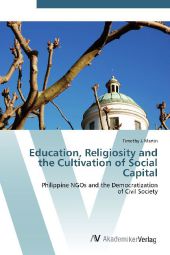 Neuerscheinungen 2012Stand: 2020-01-07 |
Schnellsuche
ISBN/Stichwort/Autor
|
Herderstraße 10
10625 Berlin
Tel.: 030 315 714 16
Fax 030 315 714 14
info@buchspektrum.de |

Timothy J. Martin
Education, Religiosity and the Cultivation of Social Capital
Philippine NGOs and the Democratization of Civil Society
Aufl. 2012. 332 S. 220 mm
Verlag/Jahr: AV AKADEMIKERVERLAG 2012
ISBN: 3-639-43295-9 (3639432959) / 3-8364-5654-0 (3836456540)
Neue ISBN: 978-3-639-43295-4 (9783639432954) / 978-3-8364-5654-8 (9783836456548)
Preis und Lieferzeit: Bitte klicken
Revision with unchanged content. The Philippine political milieu is characterized by a "weak state" dominated by elite cacique patron-client relations whom exploit state mechanisms for the private accumulation and distribution of public resources. Drawing on a rich collection of sources, this book examines the democratizing capacity of two forces within Philippine civil society--Nongovernmental Organizations (NGOs) and Catholic religiosity. Through an analysis of the political education, popular education, and micro-enterprise development efforts of three reputable Catholic NGOs, this book concludes that: 1) there are serious educational and knowledge conceptualization challenges inhibiting NGO democratization, and 2) Catholic religiosity is paradoxical concerning democracy, both reinforcing traditional patron-client patterns as well as offering a vast social capital and potent cultural framework for justifying and animating democratization at all levels of Philippine society. This book´s thorough and detailed analysis offers theoretical insight as well as practical solutions to please both theorists and practitioners interested in the relationship between religion, democracy, and social capital.
received his Ph.D. in Comparative Education from Loyola University, Chicago. He currently teaches as an adjunct professor at Loyola University and instructor at Loyola Academy, Wilmette IL. His interests include religious social capital, narrative theory, democratization and civil society, and community-based education.


